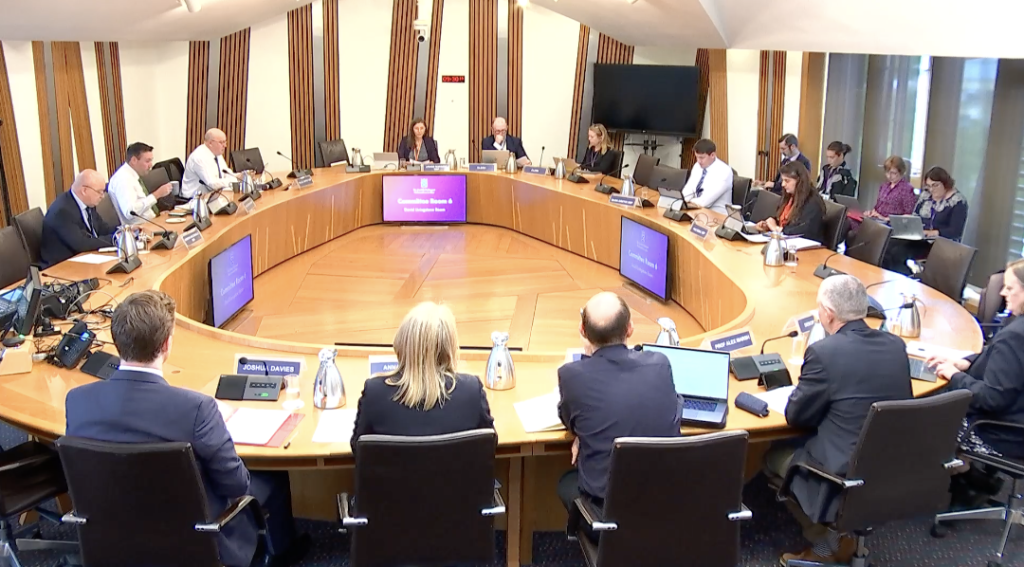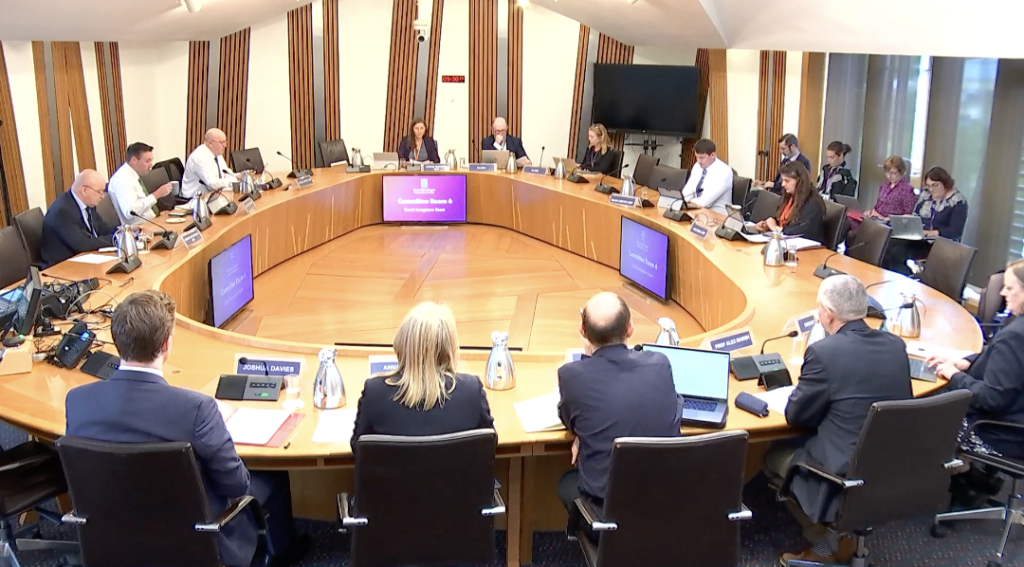
by Joshua Davies, Programme Manager for Transforming the Private Rented Sector
Last Tuesday (11 June) presented a crucial opportunity for the Nationwide Foundation to share decades of expertise and experience working in the private rented sector. Joshua Davies, programme manager for Transforming the Private Rented Sector, appeared before the Scottish parliament’s Local Government, Housing and Planning Committee to discuss the Scotland (Housing) Bill and how the Foundation’s research could inform the proposed legislation.
The Scottish government introduced the bill in March, seeking to reform housing policy, provide more protections for tenants, prevent homelessness, and more. The hearing gave expert witnesses, including Joshua, the chance to offer their thoughts on the possible impact of the proposals.
During the session, we focused on our Rent Better research, a five-year study on the effects of recent tenancy reforms in Scotland. Anna Evans, who led the research, appeared on the panel alongside Joshua.
The change the Nationwide Foundation wants to see
We know that a decent, safe, affordable home is the foundation of a healthy and happy life but that, at the moment, many private renters in Scotland are living in poor-quality and unaffordable homes.
Given this, overall, we view the proposals in Scotland as undoubtedly a step in the right direction. However, our research shows that any legislative changes must go further if private renters are to get the support they need, particularly in three key areas:
- Tenants’ rights: much more needs to be done to support tenants to know and feel comfortable using their rights.
- The wider housing system: we need to tackle challenges in the housing system as a whole and not seek to change it in a piecemeal or siloed way.
- Failings of existing legislation: we must address the failings of existing legislation.
Tenants’ rights
As Joshua told the panel, it’s one thing for tenants to have rights – but another for them to use them. Our Rent Better research finds that despite having more rights under recently introduced legislation, tenants are often unaware of them or don’t know how to use them, leaving them feeling disempowered.
Strikingly, of the 1,000 renters interviewed for the research, only 10 – not 10 per cent, but 10 individual renters – had ever contacted their local authority enforcement teams.
What’s more, even if tenants were more frequently contacting enforcement teams, local authorities simply don’t have the resources to enforce the law properly, meaning that, without more resources, any changes to tenancy law risk being ineffective, as landlords will know that breaches are likely to go unpunished.
Joshua shares Tony’s story, a renter who suffered significant stress as a result of almost being made homeless and struggling to get disrepair seen to.
To address this issue, the Scottish government needs to introduce a variety of measures to enable tenants to know and use their rights, including information, advice, and support.
In addition, as well as providing extra resources so that enforcement efforts are adequate, local authorities should share best practices and improve data collection so that they know what’s happening in their areas, and skills gaps should be addressed so that staff are appropriately trained.
The wider housing system
Joshua made the case that isolated changes to the housing system risk missing the bigger picture and producing unintended consequences.
The Scottish housing bill includes measures for a form of rent controls. But we can’t assess the merits and possible drawbacks of such measures in isolation. We need to step back, look at the housing sector as a whole, and think about why the demand for private rented homes is so high and out of balance with the supply.
Unaffordable homes have an enormous impact on people’s health and wellbeing. The government should consider providing more affordable alternatives for renters – particularly the most vulnerable – by increasing the availability of social homes and other forms of genuinely affordable housing. This way, everyone can have access to a decent home they can afford, laying the foundations for a happy and healthy life.
Failings of existing legislation
Our research revealed problems with existing legislation in Scotland that need addressing.
Everyone deserves a secure place to call home for as long as they need it. But we found evidence that some landlords have abused the grounds for eviction that allow a landlord to evict a tenant when the tenant doesn’t want to leave (no-fault grounds). As an example, landlords are permitted to evict a tenant if they plan to sell their property, but in 20% of cases, the landlord in fact doesn’t sell, and the property remains on the market.
Joshua describes the experience of Luke, a renter who was evicted using the sale ground but subsequently spotted the property back on the market being advertised to let.
Here, we need to strengthen the evidential requirements placed on landlords and prevent them from re-letting previously sold properties for a certain period so that tenants can feel the sense of security that a home should provide.
Next steps
The Bill will continue its progress through the Scottish parliament, and we’ll keep pushing for changes that will make it really work for renters.
We all need access to a decent and secure home that supports our health and enables us to thrive in every aspect of life. If done right and implemented properly, the Scotland (Housing) Bill could provide much more security and stability for renters in Scotland and guide the development of any new legislation formulated in the rest of the UK.
The full findings of the final wave of our Rent Better research will be available shortly. Sign up for our newsletter or follow us on X/Twitter to be the first to hear when they are.

